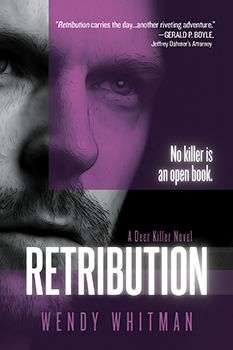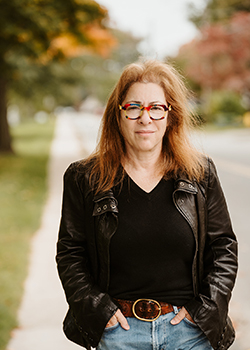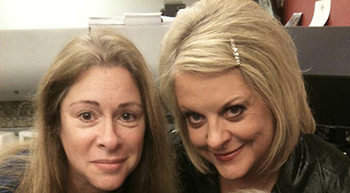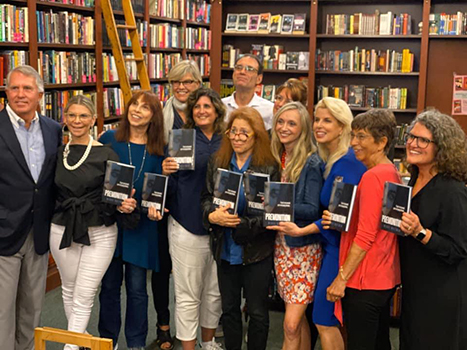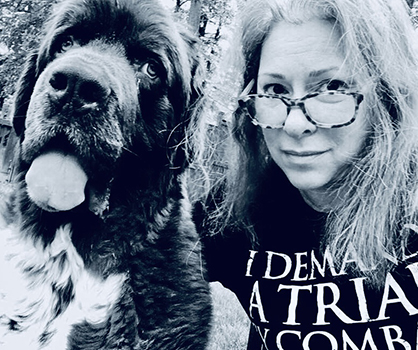

Features Wendy Whitman
Putting the Truth in Fiction: Wendy Whitman on RETRIBUTION
In a world where crime as popular entertainment dominates bestseller lists, headlines, and ratings (think that old adage: “if it bleeds, it leads”), Wendy Whitman has embraced fiction as a means to reconcile sensationalism with the realities of criminality and victimization. A former executive and producer at Court TV and HLN, she appeared for many years as an on-air producer/reporter for the Nancy Grace show. Drawing on that background and her formal education—Whitman earned a degree in English and Photography from Tufts University and later graduated from Boston University School of Law—she made her debut as a novelist with 2021’s Premonition, the first book in her Deer Killer series.
This July, Whitman returned with a direct follow-up: RETRIBUTION. Here, Detective Harriet “Hank” Nowak is in pursuit of a serial killer whose crimes hit uncomfortably close to home. And while Hank’s dedication to justice remains unquestioned, her objectivity is tested by an unexpected development—her romance with Cary Mackin, whose own involvement in the case makes their relationship taboo. As Hank’s personal and professional lives collide, this secret threatens to be her undoing. Will the truth set her free—or will the “Deer Killer” exploit her vulnerabilities as he exacts his devious and deadly plan?
Here, Wendy Whitman talks to The Big Thrill about her transition from television to novels, the ways in which her unique history informs her approach to craft, how she endeavors to balance entertainment with enlightenment, the real-life victims RETRIBUTION acknowledges, and her love (and advocacy) of dogs, whose four-legged presence is honored within her books.
RETRIBUTION is a sequel to Premonition and picks up immediately after the events of the first book. What should your new readers know about the Deer Killer series before plunging in—and how will returning readers find their experience enhanced by the knowledge they bring to this book?
An important thing for readers new to the Deer Killer series to know about is my background at Court TV and on the Nancy Grace show covering high-profile murder cases for nearly 20 years. I incorporated information about many true crimes throughout both novels even though they are fiction, and I believe this brings a touch of realism to the books that other crime thrillers may lack. My website’s tagline is: Bringing True Crime Experience to Crime Thrillers. I think that says it all.
I have been asked in interviews if RETRIBUTION can be read as a stand-alone book. That is a difficult question to answer. Those who have already read Premonition will clearly have a better handle on the storyline in general, as well as the characters in the sequel. However, that doesn’t mean that RETRIBUTION can’t be enjoyed and understood by everyone. I wish that I could read RETRIBUTION from the perspective of someone who never read Premonition to see how the story would differ from that of a person familiar with both novels. I think readers of Premonition will be surprised by some of the developments in the second book and enjoy learning more about the killer, as RETRIBUTION is mostly told from his point of view.
Viewpoints shift throughout the narrative, requiring you to inhabit a range of characters—from cops to criminals. How do you go about getting into their individual headspaces, and what is your process like to account for the procedural and psychological elements you incorporate?
During my time at Court TV and on Nancy’s show, I was fortunate to study and learn a great deal about both the criminal mind as well as law enforcement. After covering gruesome murder cases for decades, I began to understand how a murderer thinks and what motivates them. Likewise, I also met and spent time with many police officers, district attorneys, and defense lawyers. I did an event at the Mysterious Bookshop for Premonition and was asked a similar question: Was it difficult to get into the head of a serial killer? I answered: sadly, no.
When I was writing one particular scene in RETRIBUTION where the killer begins to murder a young woman, I instinctively knew what he was thinking and what he would do next. It was a bit eerie. On the flip side, one of the most special afternoons I spent at Court TV was with renowned Manson district attorney Vincent Bugliosi. It was fascinating to listen to his memories of prosecuting the Sharon Tate-LaBianca murders. In that regard, my process was to be as accurate as possible in terms of legal matters, while utilizing my experience dealing with killers and police officers to make the psychological portions of the book believable.
One of the sensitive issues that your detective, Hank Nowak, must deal with is a (largely secret) romantic relationship with Cary Mackin, who was left for dead at the end of Premonition. In what ways does their coupling complicate things for Hank, both personally and professionally?
Detective Harriet “Hank” Nowak is a true professional, having followed in her father’s footsteps by deciding to become a cop. While she tries to do everything by the book, an unexpected attraction and romantic relationship develops between her and Cary Mackin, a key player involved in the “Deer Killer” murders. As the story unfolds, Hank becomes more and more aware of the potential damage her affair with Cary could have on her career should it become public. Not one to hide things, in general, Hank struggles with her decision to keep their situation more or less a secret.
Personally, Hank is a bit more conflicted sexually than Cary and identifies as bisexual. She never told her father about a previous relationship she’d had with another woman and isn’t sure how her father would react to the revelation. But ultimately, what drives Hank to pursue the “Deer Killer” and try to solve the case is her love for both Cary and justice.
Both Hank and Cary are passionate dog lovers—a characteristic they share with you. What do you hope to convey about our canine companions through the four-legged characters that populate your books?
Two things led me to include my love of dogs in the crime thrillers I have written. One was my devotion to Obelus, my family’s Newfoundland who we lost in 2019 to a debilitating neurological illness. The other is my obsession with and involvement in trying to stop the dog meat trade in Asia. June is the month of the Yulin “festival” where thousands of dogs are rounded up and kept in deplorable conditions, awaiting a gruesome death.
I have devoted myself to raising awareness about the year-round dog meat trade and volunteering for organizations dedicated to ending it. In April, I had the honor of meeting twenty-two dog meat trade survivors and welcoming them to America. I hope my books will make people think about how badly animals are treated and what they can do to stop it.
You have a unique background, having worked for both Court TV and HLN, and having acted as a producer/on-air reporter for Nancy Grace, which would seem to lend itself well to writing crime novels. What inspired you to make the transition to fiction? Also, tell us what in your past experiences lent itself particularly well to this new career vs. what has been most challenging.
After spending nearly 20 years covering murder cases, I always felt I had a book in me. Initially, I had planned on writing a non-fiction book, possibly about the legal system or a particular case. But one evening I literally woke up in the middle of the night and realized I could do everything I wanted to do in a fictitious crime thriller. I wrote until five in the morning and didn’t stop for four months until the first draft was completed.
There is no doubt in my mind that I could never have written the books I did without my vast knowledge of and experience covering crime. I believe my years at Court TV and on Nancy’s show shine through every page of both novels. The most challenging thing about writing and publishing a book has been the marketing side. There is a learning curve regarding the best way to promote a book and no road map. It is a work in progress and very challenging.
After covering gruesome murder cases for decades, I began to understand how a murderer thinks and what motivates them.
To expand on that: How do you endeavor to balance the entertainment value of crime stories with sensitivity to the realities of criminality and victimization, given the intimate knowledge you have of the latter?
One of the biggest personal conflicts I grappled with while working in crime journalism was the effect the coverage could potentially have on the victims’ friends and families. At Court TV, we did everything possible to present any given case objectively and treat the victims and players with the utmost respect. But as I’ve said in other interviews, many cases get blown up in the media through nobody’s fault, and therefore, murder often becomes entertainment and murderers become celebrities. This is indeed an unfortunate and unintended consequence of having a transparent judicial system. I believe, however, that in a free society, it is imperative that, whenever possible, every citizen should have access to legal proceedings and therefore, be able to make their own personal assessment of the verdict.
RETRIBUTION is dedicated to two real victims of crime: Tracy Paules and Channon Christian (and “all the others”). Tell us why these women’s stories resonated with you. Also, how do you hope your acknowledgment of them brings awareness to/honors others who’ve experienced a similar fate?
One of my main goals in writing Premonition was to make people understand what it feels like to be murdered and the effect it has on the victim’s family. In the summer of 1990, serial killer Danny Rolling viciously murdered five college students in Gainesville, Florida. Tracy Paules was his last victim. I remember at the time seeing a photo of Tracy, looking straight into the camera. A picture taken before she had the slightest idea what was going to happen to her. That image haunted me for decades.
Channon Christian was gang raped along with her boyfriend Christopher Newsom in January of 2007 and kept for days before being stuffed into a garbage can and suffocating to death. Tracy and Channon were two beautiful young women just beginning their adult lives and had everything to live for. They died the most horrific, absolute worst deaths anyone ever could. I have never been able to shake what happened to them. So, I used my novels to call attention to their lives and deaths because they deserve to be remembered. “All the others” was my way of including so many more who have suffered a similar fate. Sadly, I could have used hundreds of other names in my dedication. It is so tragic.
You’re a bit of a rule breaker when it comes to following conventions (at least in terms of your storytelling!). In non-spoilery terms, what can you tease about the next Deer Killer novel?
All I can say about a possible third book in the series is that I have begun writing it and have some interesting ideas of where to take the story next. Stay tuned!
John B. Valeri is a book critic, author, and host of the web series “Central Booking” who has written for CrimeReads, Criminal Element, Mystery Scene Magazine, The National Book Review, The New York Journal of Books, The Strand Magazine, and Suspense Magazine. His popular Examiner.com column, “Hartford Books Examiner,” ran from 2009 – 2016 and was praised by James Patterson as “a haven for finding great new books.” Visit him online and watch past episodes of “Central Booking” at JohnBValeri.com.
- LAST GIRL MISSING with K.L. Murphy - July 25, 2024
- CHILD OF DUST with Yigal Zur - July 25, 2024
- THE RAVENWOOD CONSPIRACY with Michael Siverling - July 19, 2024

